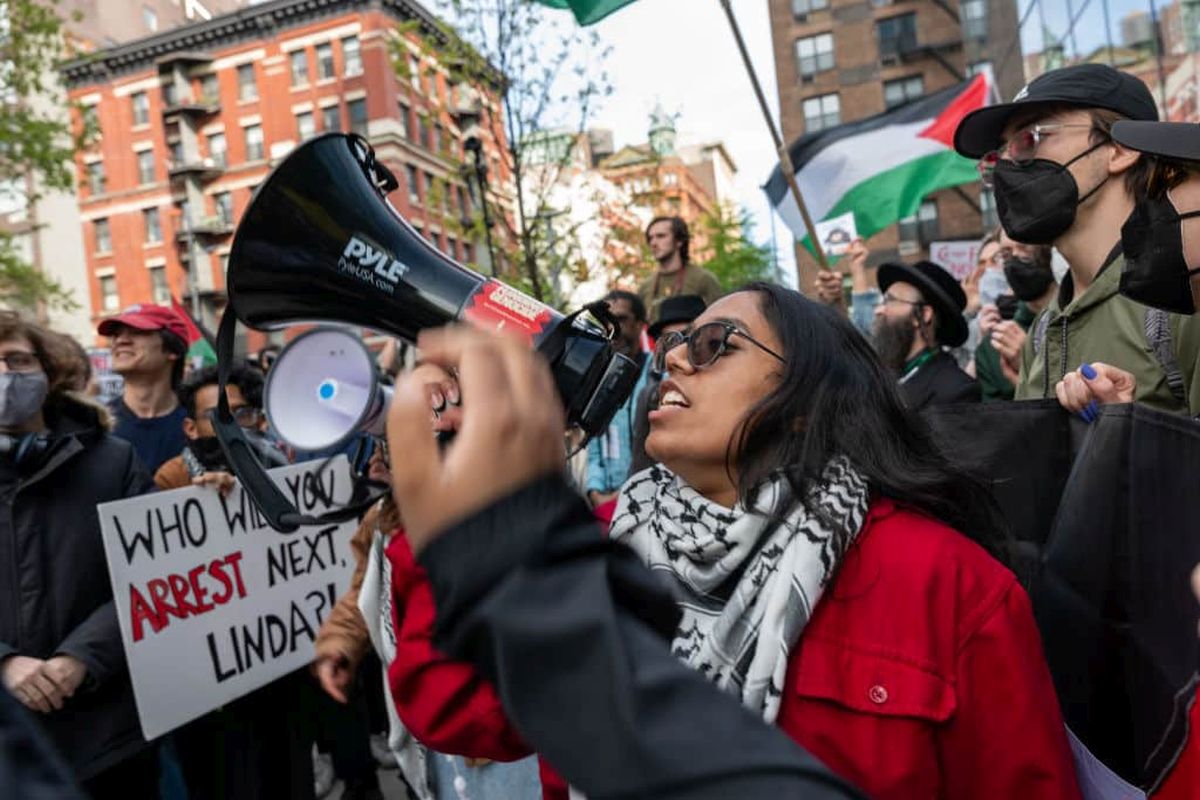
When universities reopened this fall, administrators across the country introduced policies to curb the student movement for Palestine that erupted in the spring. An alarming example is New York University, which added a paragraph to its anti-discrimination policy stating that anti-Zionist criticism is anti-Jewish discrimination.
Several days later, John Beckham, a spokesman for New York University, made a statement saying that pro-Palestinian protesters are using “Zionist” as a “code word” for “Israeli” or “Jew.”
In accordance with recent guidance from the U.S. Department of Education-Office of Civil Rights (OCR) and the agreements it has entered into with other schools, conduct that triggers our privacy policy cannot be concealed. non-discrimination and anti-harassment using the word “Zionist” as a substitute or code for Jewish or Israeli. Excluding Zionists from an open event, calling for the death of Zionists, or applying the “non-Zionist” litmus test for participation in any NYU activity are not permitted.
This is an escalation of the same repression that Palestinians and their supporters have been suffering for years. While equating Zionism with Judaism is simply false, rhetoric like this deliberately erases the reality of the genocide that Palestinians are currently enduring. In addition to hiding its own complacency in the face of genocide, New York University is redoubling its efforts and trying to silence its students.
Zionism is not a “code” for Judaism
Although the State of Israel has tried to present Zionism as a movement to protect the Jewish people against anti-Semitism, this ideology has enabled generations of violence against Palestinians. The idea is based on a right of “return”; convert Palestine into a Jewish majority state, established by imperialist declarations that did not mention the Palestinian people. Financed and armed by British and Zionist colonial funds, thousands of immigrants arrived in occupied Palestine. The Zionist project has advanced through illegal land confiscations, violent displacement, assassinations, and now carrying out the most widespread genocide in history.
By claiming this ideology as part of an individual’s identity, New York University uses Title VI as a weapon to defend colonial ideals. His policies did not mention Zionism or Zionist sentiment until the Israeli regime began to receive harsh criticism. This not only attacks the current international movement for Palestine, but also implicitly reinforces other ethno-nationalist policies.
In spring, students around the world organized encampments on university campuses – peaceful occupations of visible public spaces – to demand divestment from Israel. Beginning with the Columbia student camp in April, hundreds of students participated in the occupation of their school grounds, lobbies and buildings, with chants such as “Reveal! Divest! We will not stop, we will not rest!” Many camps lasted days; They typically included talks, art-making, and community events to spread Palestinian culture and anti-imperialist thought. Contrary to narratives spread by the media and university administrators, Jewish students actively participated in these protests, including groups such as Jewish Voice for Peace, which was suspended by Columbia even before the camp movement. These grassroots efforts to force universities to cut investment from companies that fund Israel and to academically boycott the Zionist regime were met with a disproportionate display of violence: Columbia betrayed its own promise to keep the police off campus to violently repress and vacate the camp. In total, more than 3,000 arrests were made at universities across the country in an effort to stop the movement, demonstrating the lengths to which universities are willing to go to defend their investments.
University repression of freedom of expression related to Palestine existed before the recent actions of the Zionist regime. Liberal universities have a long history of rhetorically claiming to “protect” their communities from speech they consider polarizing. Fordham University banned its Students for Justice in Palestine (SJP) chapter in 2015, triggering an unsuccessful four-year legal battle to have it reinstated, and New York University is no different. By claiming that discourse critical of Zionism is discriminatory, NYU is deliberately stopping criticism of the current colonial ideology that is the framework for the current genocide of the Palestinians.
Bipartisan support for Israel
NYU administrators, along with their counterparts across the country, are one front in a multi-pronged McCarthyite campaign against freedom of protest, centered on the bipartisan consensus of supporting and never criticizing Israel. These administrators have long been aligned with Zionism, but the upcoming elections are putting more pressure on universities to implement the state ideology. Both the Democrats and the Republican Party have millions in funding from Zionist groups like AIPAC behind their campaigns and from weapons and surveillance technology corporations that depend on a close relationship between the United States and Israel. Representatives have returned this favor, passing a bipartisan bill in the House of Representatives in December that once again falsely equates anti-Zionism with anti-Semitism. The entire State and universities are working together to defend their investments in genocidal profits. As the two parties of US imperialism strive to maintain the stability of their duopoly, they will continue to decry the growing anti-imperialist sentiment of this movement.
Against repression
This suppression of students’ free speech shows the hypocrisy of the American university system. Despite claiming that they are institutions where people are free to question thinking and support change, recent months have shown that they are only truly interested in profit. This student movement threatens to force universities to re-evaluate their priorities, represented by their investments, but since today’s neoliberal university functions largely to defend the state and imperial order, they will abandon all such pretenses of academic freedom to stifle any criticism in against or demands to give up those investments.
As Israel’s genocide threatens to spill over into a ground war with Lebanon (and leapfrog into a regional war, NdT.), many student organizations are fighting their own schools to make their voices heard. For both students and university workers to develop democratic dialogue and realize their power, we must be aware of how this censorship manifests itself and how to combat it.
To end this genocide, achieve a free Palestine, and ensure democratic dialogue persists in times of crisis, we must denounce this censorship wherever we see it, and students must refuse to remain silent. Instead of allowing administrators to impose dishonest policies on “discrimination,” students and faculty members should come together to determine university policies for themselves. The escalation in Gaza has been a repeated strategy for almost a year. The only way this movement can grow is through broader action, with solidarity between workers and students. To truly put an end to universities’ complicity in imperialism and the current genocide, nothing less than total control, by students, faculty and workers, must be the force that shapes the research and investment agenda of universities. universities.
Source: www.laizquierdadiario.com

